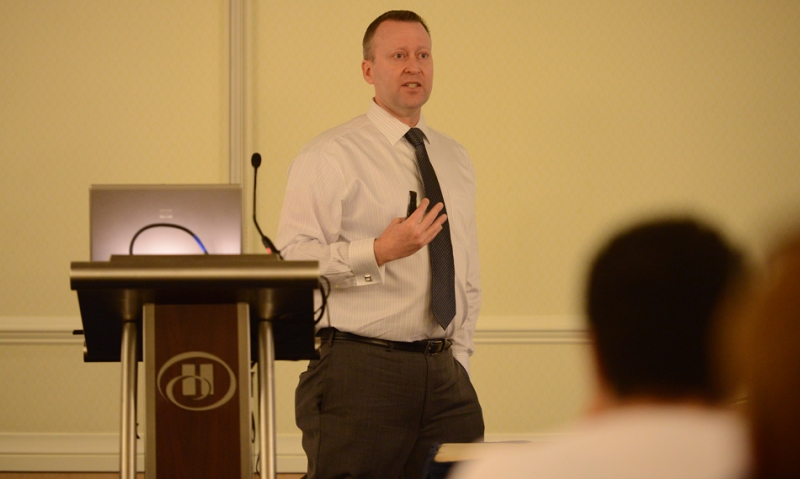
Legion For HEROES workshop brings together entrepreneurial experts to offer women veterans keen insight into starting, sustaining their own businesses.
Mike Haynie knows a bit about entrepreneurship. A former U.S. Air Force officer and professor of management at the U.S. Air Force Academy, he now serves as a Barnes Professor of Entrepreneurship at Syracuse University’s Whitman School of Management.
Haynie has managed to combine his business experience with another passion of his – helping fellow veterans – into Syracuse’s Institute for Veterans and Military Families (IVMF), of which he’s the executive director and a founder. The institute focuses on developing impactful programming, cultivating actionable research, conducting policy analysis and providing technical assistance positioned to address the social, economic and public policy challenges facing the veterans’ community.
Haynie brought that expertise to the nation’s capital March 22-23 for The American Legion’s For HEROES (Her Entrepreneurship – Resources, Opportunities, Experiences and Support) workshop, which was co-cosponsored by the IVMF and the U.S. Small Business Administration. During Day 1 of the workshop, Haynie told the 20 or so women veteran attendees – who came from as far away as Florida to attend – that starting a business brings with it a huge responsibility.
“You should come to business ownership with a very, very open mind about the universe of what is possible for you,” he said. “The reality is the good and the bad of business ownership, it’s all you – the extent of which you’re willing to put yourself out there and be committed, dedicated (and) motivated to actually realizing your entrepreneurial goal.”
Haynie and other speakers spent the day discussing the entrepreneurial process, turning ideas into a sustainable business concept, conducting market research, and figuring out a price point for a product to both profit from and sustain the business.
Haynie pointed to businesses such as Nike, GoDaddy and AOL as companies that were founded by military veterans who directly credited their military service as the reason for their success.
“We constantly undervalue the contribution of veteran business ownership in the United States,” Haynie said. “This is an important community. The culture has entirely shifted over the course of the past five years, due in large part to our friends at the SBA and other, to the point where now we’re introducing business ownership training in (the military’s Transition Assistance Program). Today, there are more resources positioned to support all of you as veteran business owners than there ever have been in our history.”
Haynie discussed different paths to business ownership, including buying an existing business, buying a franchise and going into the family business, and he stressed the importance not only of the results of market research, but how it is conducted. He said it’s critical for potential business owners to do their own market research and to do it objectively.
“Don't go with your gut or heart on a market analysis,” Haynie said. “You have to go with facts.”
Antonio Doss, district director for SBA’s D.C. office, said all the pieces need to be in place when starting a business – including personnel. “You need somebody who can sell a product, good or service,” he said. “You need somebody who knows how to manufacture or put together whatever that is you’re selling. And you need somebody who knows how to manage the operations, which could include everything from … tax issues, how to figure out payroll taxes.
“You need somebody who understands all three of those. The likelihood that (one person) has all three of those really, really solid, it’s slim. So think about your strengths, and then think about where the areas are where you need more support and more help. And look for ways to bring in that additional skill/talent/knowledge level so that you can do the things that you want to be able to do, and do them in the most successful way.”
To ensure all those bases are covered, Doss offered the services of an SBA Small Business Development Center advisor. Along other SBA lines, Kenneth White – vice president of Revere Bank, an SBA lender – provided tips on how to apply for a small business loan. And Rhett Jeppson, associate administrator of SBA’s Office of Veterans Business Development, praised the Legion for conducting the workshop. “We work with a lot of (veterans service organizations), but the Legion really leads the way working with us,” he said.
- Washington Conference

